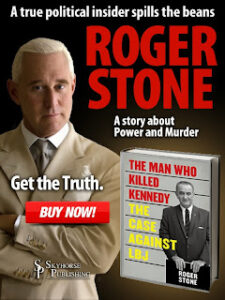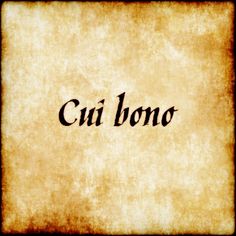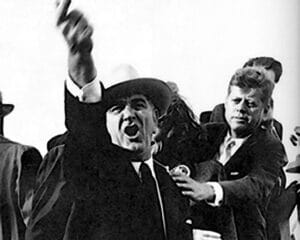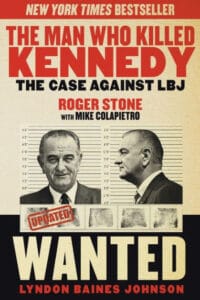The assassination of President John F. Kennedy in Dallas, Texas, November 22, 1963. It is the greatest historical mystery in my lifetime; I was eleven years old when it occurred. Who did it? Lee Harvey Oswald, an ex-Marine, married to a Russian woman, and who had lived in Russia for a couple of years? Fidel Castro‘s men? As payback for the Bay of Pigs invasion? The Mafia? They had helped him get elected in 1960, but now his brother, Bobby Kennedy, the US Attorney General, was making life hard on the Cosa Nostra. Jack had fired Allen Dulles, the head of the Central Intelligence Agency (CIA) after the Bay of Pigs. Maybe rogue CIA agents had a hand in the President’s death? Or perhaps the crafty J. Edgar Hoover, longtime boss of the Federal Bureau of Investigation (FBI) played a role? Reportedly Kennedy was going to ease Hoover out of the top FBI job.
Starting in 1963, and continuing to this day, it has become fashionable to disparage everyone who takes an alternative view about an historical event by calling them “A Conspiracy Nut,” or words to that effect. But always remember, just because something is a conspiracy theory doesn’t mean it didn’t actually happen.
If you are one of those that believe everything a network talking head, reading off a teleprompter, tells you, or you blow with the winds of popular thought, or who couldn’t follow a line of florescent dots on the floor leading to the bathroom even if you had rampant diarrhea, you need to know that generally if you can reason, think logically, and can connect dots to solve difficult puzzles, you will generally do better in life than if you are unable, or worse unwilling, to do so.
Because that often translates into being a pawn for those who will take advantage of you. I hope that I have some small ability to “connect the dots” to find out what really happened in history, especially involving significant mysteries. And to show you that you can connect dots as well, and not be anyone’s pawn.
Part of that stems from serving in the Army, during which I was lucky enough to carry out a tour as an Inspector General for the United States Army Europe – often investigating situations that involved complex facts and human behavior, which often follows patterns of great repetition. I also have been flat lucky enough to run into evidence and documents that for whatever reason should have been in the public domain, but were not – the most significant of I was able to turn into a book, The Fifth Field: The Story of the 96 American Soldiers Sentenced to Death and Executed in Europe and North Africa in World War II. If you have followed this website even briefly, you know this work deals with how 96 American soldiers in Europe and North Africa were tried by American General Courts-Martial, convicted by military juries, sentenced to death, executed and buried in an obscure, secret plot at an American military cemetery in France.
While after the book was published, the court-martial records were transferred from a closet to the National Archives, it still appears that one needs a special permission to actually visit the section at the Oise-Aisne American Cemetery and Memorial outside Seringes-et-Nesles, France. If you visited there, and were given permission to see the special field where these men are buried, please email me with that information, and I shall include that.
My discovery, however, of what really happened in those significant events pales in comparison to The Man Who Killed Kennedy: The Case Against LBJ, by Roger Stone. Now, let us address the obvious: if you do not like Roger Stone, you may use that bias to disbelieve anything and everything he writes or says. That would be unfortunate for you.
I believe that Stone would never claim to be a professional author, even though he has written six other books, writing has not been his life’s primary work; to make sure he obtained the correct flow, sequencing, level of support documentation and so forth, he enlisted Mike Colapietro, who not only is an excellent writer, but also had practical law enforcement, serving in the Office of the Chief of Staff at the Broward Sheriff’s Office in Fort Lauderdale, Florida.
Meanwhile Stone, the consummate political insider, talked to numerous government officials during his career beginning in 1972. Fascinated by the assassination – as were a lot of people our age (Roger is 70; I am 71 and np, I have never communicated with him) since about 1972, he would always ask guys about it, as he did favors for them, including some really high guys. One “suggested” he not put anything in writing until the 50th anniversary, 2013, when all the folks talking would be dead by then!!!
Stone and Colapietro began this story with a time-tested truism for a murder investigator’s first question, cui bono (who benefits)? In most cases, that may come to be a life insurance policy with the killer is the beneficiary, or killing a spouse to avoid alimony payments, or the killing of a witness by a defendant in another criminal case so that person cannot testify against the perpetrator.
Stone and Colapietro then expanded that to: who had the most to gain from Kennedy’s death at this moment in 1963?
Then they asked themselves: who had the most to lose by a second John F. Kennedy presidential term beginning in 1965? The answers soon became obvious, and maybe you already know the following:
- Vice-President Lyndon Johnson wanted to become President, hopefully running in 1968 after John Kennedy’s second term in office. However, Johnson became convinced that Kennedy was planning to dump him from the ticket prior to the election in 1964. Even worse, law enforcement was closing in on Johnson for several instances of graft and bribery – charges that might go public and lead to an indictment before the end of 1963. After Johnson assumed the Presidency, the charges went away. Cui bono?
- President Kennedy had informed the chief of the Federal Bureau of Investigation (FBI), J. Edgar Hoover, that he would face mandatory retirement from that position in 1965. Hoover joined the Justice Department in 1917 and was named director of the Department’s Bureau of Investigation in 1924, which later became the FBI. Hoover wanted to remain in the job, but was not supported in that request by his immediate boss, Robert F. Kennedy, the U.S. Attorney General and the President’s younger brother. Vice-President Johnson supported Hoover as FBI chief, and Hoover remained in that position until 1972. Cui bono?
- The Mafia provided valuable support at the request to Joe Kennedy, John F. Kennedy’s father, especially in West Virginia and Illinois, in the 1960 election of Kennedy. However, after assuming office, not only did President Kennedy not turn a blind eye toward Mafia activities, he appointed his younger brother Robert as U.S. Attorney General. Bobby was an existential enemy of the Mafia. In 1962 alone, Robert Kennedy touted the fact that prosecutions for racketeering by his Organized Crime Section in the Justice Department rose by 300 percent above 1961 and convictions of organized criminals grew by 350 percent. Kennedy left the Attorney General position just ten months after his brother was killed. Cui bono?
Using that as a guidepost, the authors concluded that in the end, Vice-President Lyndon Johnson leveraged his personal connections in Texas; and from nationwide organized crime (the Mafia,) and from the federal government – specifically the FBI and the CIA – to form a conspiracy to murder President John F. Kennedy on November 22, 1963. And he used his influence to personally select the subsequent Warren Commission that would cover up the participants in that crime.
But you don’t have to just take my word for it. Here are some other comments. Because far too many people pre-judge a person’s opinion based on political leanings, race, creed, religion or other characteristic, I have omitted names and used only titles.
“A consummate political insider, Roger Stone views the JFK assassination through the prism of a murder investigator’s first question, cui bono (who benefits)? Stone’s shocking answer is that the primary suspect has been hiding in plain sight for 50 years: LBJ. A riveting account.” – Former U.S. Attorney
“Any serious student of politics or history should read Roger Stone’s stunning new book The Man Who Killed Kennedy.” – Judge
“Roger Stone nails LBJ for JFK murder!” – Journalist, Filmmaker
“Stone’s book will change American history forever!” – Historian
Do yourself a favor that will change your viewpoint, because the assassination of President Kennedy in 1963 fundamentally changed this country, and not for the better. Read The Man Who Killed Kennedy: The Case Against LBJ.



